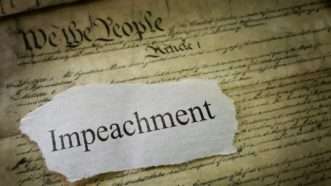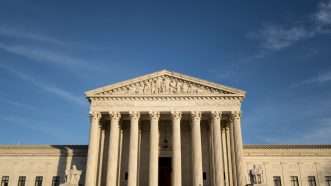Free Speech
"What Cheap Speech Has Done: (Greater) Equality and Its Discontents"
I'm serializing a forthcoming law review article of mine.
Larry Flynt Made the World Freer for Everybody by Pushing Boundaries
Abrasive, tasteless, and uncompromising, Flynt undoubtedly made the world safer for speech of all varieties.
FBI Arrests Activist Daniel Baker Over Posts About Police Abuse and Self Defense
Plus: The aftermath of the New York Times' anti-Pornhub crusade, and more...
N.J. Law Forbids Naming a Judge's, Prosecutor's, or Police Officer's Close Relatives Online,
whenever the judge, prosecutor, or police officer demands that the relative's name be taken down.
The Eighth Circuit's Narrow Decision About the Arkansas BDS Statute
One provision has been invalidated, but the general ban on boycotts of Israel by most state government contractors still stands.
Publishing Another Newspaper's Spiked Story: Copyright Infringement or Fair Use?
Likely fair use, at least under the Second Circuit's precedents.
Plaintiff Can't Sue for Claimed Constitutional Violations but Keep Key Facts Sealed
"It is simply not reasonable for a plaintiff to bring a case alleging that his constitutional rights were violated by state officials and not expect the facts on which those officials based their actions to be included in the public record of a case."
This Gun Shop Says It Won't Do Business With Biden Voters
Tech companies should have the same freedom to choose their customers.
Journalists Worried About People Having Conversations on Clubhouse
A person you know might be having an online conversation without a transcriptionist and a fact-checker right now, and we have to stop it.
Bret Stephens' Spiked Story on the Donald McNeil Firing, Published by the New York Post
"Unfit to Print: The Post publishes column The Times wouldn't"
"Does the Government Have the Right to Control Content Moderation Decisions?"
My conversation with Prof. Eric Goldman (Santa Clara) via the UCLA Institute for Technology, Law, and Policy.
Avenatti v. Fox News Getting Funner (at Least for Law Geeks Like Me)
Third Circuit Judge Stephanos Bibas has been appointed to hear the case.
Trump's Impeachment Lawyers Try To Deconstruct the Link Between What He Said and What His Followers Did
No amount of parsing can obscure his responsibility for the deadly attack on the Capitol.
The Vote-by-Tweet Memes Prosecution
The First Amendment and statutory questions in the Douglass Mackey / Ricky Vaughn case.
Trump's Dubious First Amendment Defense Against Impeachment
He is on firmer ground in arguing that the Senate does not have the authority to try a former president, although that issue is highly contested.
Civil Liberties Groups Plead With Biden To Stop Persecuting Julian Assange
Plus: Oklahoma cosmetologists fight insane licensing requirement, Australia doesn't understand how search engines work, and more...
Tennessee Pharmacy School Nearly Expelled Student for Twitter Sex Talk
The Foundation for Individual Rights in Education is suing on her behalf.
Interesting #TheyLied Appellate Libel Decision in Response to #MeToo Claims
I've been seeing many such libel lawsuits recently, though only a few have gone so far as to yield a verdict for the libel plaintiff.
Prof. Eric Goldman & Me on Whether Governments Can Limit Platforms' Content Blocking Decisions
A forthcoming panel Thu., Feb. 11, 2 to 3 pm Pacific, organized by the UCLA Institute for Technology, Law, and Policy.
"Censorship by Zoom and Other Private Platforms": The UC Academic Freedom Committee's Concerns
"The University’s responsibility to protect academic freedom and freedom of expression cannot be outsourced."
University Decisions About Funding Student Groups Can't Rely on "Unbridled Discretion"
An interesting ruling involving the University of Minnesota, by Judge Patrick Schiltz (himself a former professor).
Florida Gov. Ron DeSantis Wants $100,000 Fines for Social Media Companies That Deplatform Politicians
It’s a terrible idea that violates Section 230, but is it actually unconstitutional? Don’t be so sure.
Trump's Lawyers Say He Can't Be Impeached for Trying to Subvert the Election Because He Was Just Expressing an Opinion
They also argue that the Senate has no authority to try a former president.
House Impeachment Managers and Trump's Defense Lawyers File their Impeachment Trial Briefs
The House brief does a solid job of laying out the case against Trump. The defense brief is far less impressive.
'See Something, Say Something Online Act' Punishes Big Tech for Not Snitching
Plus: Oregon decriminalizes hard drugs, Kroger closes stores over hazard pay rule, and more...
"To Say That the Court Finds the Motion Puzzling Is to Do a Disservice to Puzzles Everywhere"
Plus a special appearance by The Princess Bride and Weekend at Bernie's.
Treating Lin Wood's Wild Conspiracy Theories As a Psychiatric Symptom Invites Him to Play Free Speech Martyr
The State Bar of Georgia is demanding that the pro-Trump lawyer undergo a mental health evaluation.
Maryland High Court Upholds 8½-Year Sentence for Perjurious Claim of Unwanted Sexual Touching
The defendant swore a Verizon store employee "cupped her breast and touched her inner thigh," but surveillance video showed otherwise.
Europe Considers Orwellian Proposal To Protect Its Dairy Industry From Vegan Competitors
Consumers aren't confused about where plant milks come from. Quite the opposite, in fact.
Americans Abandoning Free Speech Better Brace for the Consequences
Government will happily suppress misinformation in favor of misinformation of its own.
California Law Limiting Private Employers' Restriction on Employee Speech
applied by a federal court in a case involving Juul Labs.
Court Allows U.S. Prosecution for American's North Korea Speech About Cryptocurrency
A decision in the case of Ethereum researcher Virgil Griffith, denying his motion to dismiss.
The Supreme Court's Next Big Free Speech Showdown
May public schools punish students for off-campus social media posts?
Legislator Free to Block Users from Her Campaign-Focused Twitter Account
So the Eighth Circuit held yesterday, distinguishing the @RealDonaldTrump case on the grounds that the Trump account was used for much more official activity.
Can California Employee Be Fired for Attending the Jan. 6 Protest at the Capitol?
California statutes suggest the answer may be no, so long as the firing is based on the political activity, and not on criminal conduct.
May N.Y. Businesses Fire Employees for Using Parler and Gab?
Colleen Oefelein was fired by the Jennifer De Chiara Literary Agency, and the incident illustrates the vagueness of New York law on this point.
Sedition Cases Against Capitol Rioters 'Will Bear Fruit Very Soon,' Says FBI
Plus: Senators call impeachment trial unconstitutional, Biden cancels private prison contracts, Apple sued over Telegram, and more...
Public Has Right "to See What Is Going Into the Sausage Factory [of Litigation], Even if a Particular Sausage Is Never Made"
Federal court holds that documents accompanying motions are presumptively accessible even if the case settles before the court decides the motion.


















